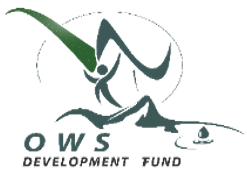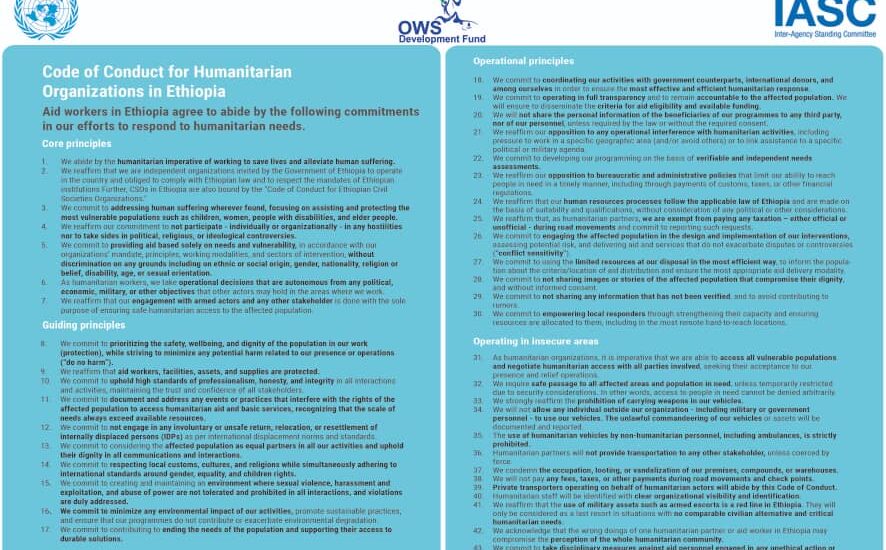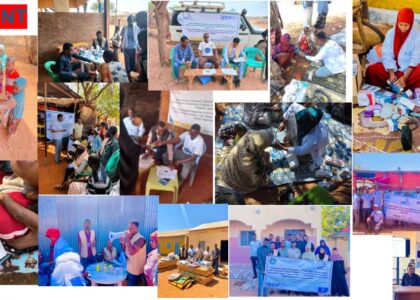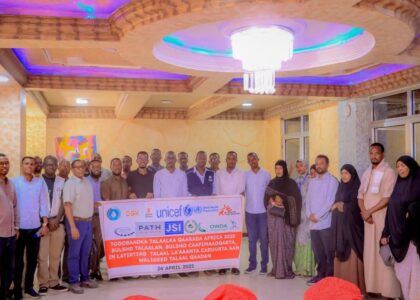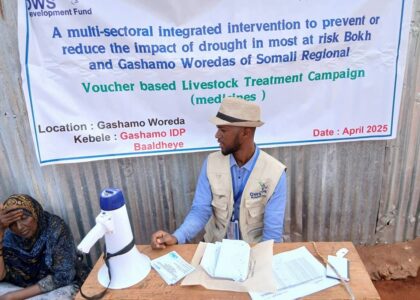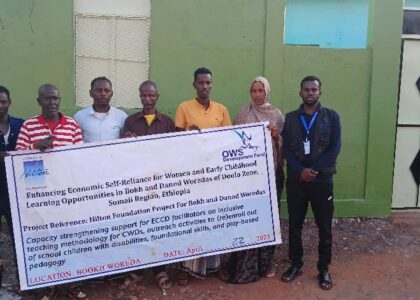Aid workers in Ethiopia agree to abide by the following commitments in our efforts to respond to humanitarian needs.
Core principles
1. We abide by the humanitarian imperative of working to save lives and alleviate human suffering.
2. We reaffirm that we are independent organizations invited by the Government of Ethiopia to operate in the country and obliged to comply with Ethiopian law and to respect the mandates of Ethiopian institutions Further, CSOs in Ethiopia are also bound by the “Code of Conduct for Ethiopian Civil Societies Organizations.”
3. We commit to addressing human suffering wherever found, focusing on assisting and protecting the most vulnerable populations such as children, women, people with disabilities, and elder people.
4. We reaffirm our commitment to not participate – individually or organizationally – in any hostilities nor to take sides in political, religious, or ideological controversies.
5. We commit to providing aid based solely on needs and vulnerability, in accordance with our organizations’ mandate, principles, working modalities, and sectors of intervention, without discrimination on any grounds including on ethnic or social origin, gender, nationality, religion or belief, disability, age, or sexual orientation.
6. As humanitarian workers, we take operational decisions that are autonomous from any political, economic, military, or other objectives that other actors may hold in the areas where we work.
7. We reaffirm that our engagement with armed actors and any other stakeholder is done with the sole purpose of ensuring safe humanitarian access to the affected population.
Guiding principles
8. We commit to prioritizing the safety, wellbeing, and dignity of the population in our work (protection), while striving to minimize any potential harm related to our presence or operations (“do no harm”).
9. We reaffirm that aid workers, facilities, assets, and supplies are protected.
10. We commit to uphold high standards of professionalism, honesty, and integrity in all interactions and activities, maintaining the trust and confidence of all stakeholders.
11. We commit to document and address any events or practices that interfere with the rights of the affected population to access humanitarian aid and basic services, recognizing that the scale of needs always exceeds available resources.
12. We commit to not engage in any involuntary or unsafe return, relocation, or resettlement of internally displaced persons (IDPs) as per international displacement norms and standards.
13. We commit to considering the affected population as equal partners in all our activities and uphold their dignity in all communications and interactions.
14. We commit to respecting local customs, cultures, and religions while simultaneously adhering to international standards around gender, equality, and children rights.
15. We commit to creating and maintaining an environment where sexual violence, harassment and exploitation, and abuse of power are not tolerated and prohibited in all interactions, and violations are duly addressed.
16. We commit to minimize any environmental impact of our activities, promote sustainable practices, and ensure that our programs do not contribute or exacerbate environmental degradation.
17. We commit to contributing to ending the needs of the population and supporting their access to durable solutions.
Operational principles
18. We commit to coordinating our activities with government counterparts, international donors, and among ourselves in order to ensure the most effective and efficient humanitarian response.
19. We commit to operating in full transparency and to remain accountable to the affected population. We will ensure to disseminate the criteria for aid eligibility and available funding.
20. We will not share the personal information of the beneficiaries of our programmed to any third party, nor of our personnel, unless required by the law or without the required consent.
21. We reaffirm our opposition to any operational interference with humanitarian activities, including pressure to work in a specific geographic area (and/or avoid others) or to link assistance to a specific political or military agenda.
22. We commit to developing our programming on the basis of verifiable and independent needs assessments.
23. We reaffirm our opposition to bureaucratic and administrative policies that limit our ability to reach people in need in a timely manner, including through payments of customs, taxes, or other financial regulations.
24. We reaffirm that our human resources processes follow the applicable law of Ethiopia and are made on the basis of suitability and qualifications, without consideration of any political or other considerations.
25. We reaffirm that, as humanitarian partners, we are exempt from paying any taxation – either official or unofficial – during road movements and commit to reporting such requests.
26. We commit to engaging the affected population in the design and implementation of our interventions, assessing potential risk, and delivering aid and services that do not exacerbate disputes or controversies (“conflict sensitivity”).
27. We commit to using the limited resources at our disposal in the most efficient way, to inform the population about the criteria/location of aid distribution and ensure the most appropriate aid delivery modality.
28. We commit to not sharing images or stories of the affected population that compromise their dignity, and without informed consent.
29. We commit to not sharing any information that has not been verified, and to avoid contributing to rumors.
30. We commit to empowering local responders through strengthening their capacity and ensuring resources are allocated to them, including in the most remote hard-to-reach locations.
Operating in insecure areas
31. As humanitarian organizations, it is imperative that we are able to access all vulnerable populations and negotiate humanitarian access with all parties involved, seeking their acceptance to our presence and relief operations.
32. We require safe passage to all affected areas and population in need, unless temporarily restricted due to security considerations. In other words, access to people in need cannot be denied arbitrarily.
33. We strongly reaffirm the prohibition of carrying weapons in our vehicles.
34. We will not allow any individual outside our organization – including military or government personnel – to use our vehicles. The unlawful commandeering of our vehicles or assets will be documented and reported.
35. The use of humanitarian vehicles by non-humanitarian personnel, including ambulances, is strictly prohibited.
36. Humanitarian partners will not provide transportation to any other stakeholder, unless coerced by force.
37. We condemn the occupation, looting, or vandalization of our premises, compounds, or warehouses.
38. We will not pay any fees, taxes, or other payments during road movements and check points.
39. Private transporters operating on behalf of humanitarian actors will abide by this Code of Conduct.
40. Humanitarian staff will be identified with clear organizational visibility and identification.
41. We reaffirm that the use of military assets such as armed escorts is a red line in Ethiopia. They will only be considered as a last resort in situations with no comparable civilian alternative and critical humanitarian needs.
42. We acknowledge that the wrong doings of one humanitarian partner or aid worker in Ethiopia may compromise the perception of the whole humanitarian community.
43. We commit to take disciplinary measures against aid personnel engaged in any unethical action or behavior that go against the principles outlined in this Code of Conduct.

